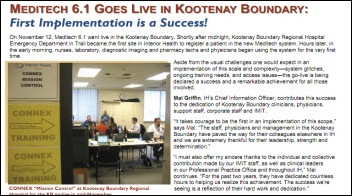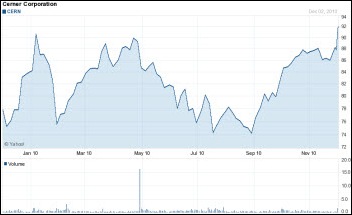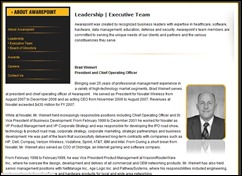Giving a patient medications in the ER, having them pop positive on a test, and then withholding further medications because…
News 12/3/10
From EHR Geek: “Re: Sunquest. Gets bought again.” Several readers sent this link over. Huntsman Gay Global Capital LLC is leading an investor group that’s planning to pay $208 million for 51% of hospital ancillary systems vendor Sunquest Information Systems from Vista Equity Partners, which paid Misys $381 million for the company in 2007. There’s some tricky financing involved, with Sunquest apparently borrowing $655 million. The deal values Sunquest at a healthy $1.2 billion. I asked one of my Wall Street experts to explain. He said it’s “an odd transaction structure and a risky one” because of the amount of debt and the chance of changing conditions that could make it hard to repay. The big winner is Vista, who gets multiples of the cash they put in just three years ago and gets to keep 49% of the company. I asked Inga to contact Sunquest for a statement, but obviously they can’t really say anything, so she got the expected “we can’t comment.” Huntsman Gay, started by the guy who invented those environment-fouling Styrofoam Big Mac coffins and who also served in Nixon’s White House (but atoned somewhat for those sins by becoming a philanthropist), appears to have no other healthcare holdings is pretty much all over the place in its $1.1 billion fund (oilfield maintenance, bedding, business process outsourcing, and equipment for electrical utilities). Maybe BCBS will be somehow involved since a company subsidiary runs a venture fund for them.
From Epicdude: “Re: Epic. UCLA just signed an enterprise contract.” Unverified, but I found fresh UCLA job postings looking for Epic people.
From Wildcat Well: “Re: what are we missing here? The American College of Physicians, based in Philadelphia, birthplace of the US, presents AmericanEHR, developed with Cientis Tech of … Canada.” Maybe they left off the North part.
Weird News Andy first pointed out that bedbugs shut down a hospital floor, but he amended that statement that PEOPLE were the problem. NYU’s Hospital for Joint Diseases closes an entire floor because a patient claimed she saw a bedbug. Sick outpatients were told not to come in, leading one quoted in the newspaper to say she’s taking her business to Beth Israel. I don’t know that I blame her: does one unverified bedbug sighting really justify closing a hospital floor, especially given the far more dangerous bacterial types crawling all over? Maybe it was a ruse to get a less-affluent Saudi royal their own entire US hospital floor like the King got over at NYP.
WNA also weighed in with a “Say What?” on my story about patients in China having to pay cash for medical services because someone stole the cable carrying a hospital’s Internet connectivity. He summarizes thusly: “We moving towards a government-run health care system and people in China have to pay out of pocket? Weird news indeed.”
The Meditech 6.1 implementation at Kootenary Boundary Regional Hospital (BC) apparently went well, judging from the lead story in their December hospital newsletter. From the picture of their war room, you can almost smell the stale leftover “everything” bagels, human sweat from IT people working long shifts, and the oxygen-depleting fumes emitted from overheated laptops and whirring laser printers.
In England, the National Accounting Office will investigate the $850 million contract that BT got last year, with MP Richard Bacon suggesting that up to $695 million of that amount was excessive given the scope of work performed.
I got paged at home tonight by the hospital and dialed the number on the cordless phone. Nothing happened. Then I realized: it’s not like a cell phone where you dial and then press the button – you have to press the button, get a dial tone, and then dial. My brain knows this, of course, but my fingers sometimes forget because I don’t dial the land-line all that often. I bet I’m not the only one.
National eHealth Collaborative is looking for new board members. Your hat must be in the ring by December 22 (and yes, shockingly, it’s December already).
Omnicell announces a new version of the Pandora drug diversion detection system it bought in October. They’re at ASHP, of course, like most vendors of anything pharmacy-related.
Terri Steinberg MD MBA, CMIO of Christiana Care, sent over their patient safety submission that just won them a Cheers award from the Institute for Safe Medication Practices. She mentions some ways to influence doctors via CPOE that I had talked about the other day: when considering the choices to offer, put the best one first, make it the default, and standardize the list. They won the award for work with hydromorphone injection, with better success with CPOE than they’d had on paper. They defaulted lower doses, forced choosing a pain scale reason for high doses, required an indication for use, and added CPOE dosing alerts. They successfully reduced too-high initial doses and increased the number of doses within the recommended range. I’ll stick with what I’ve always said: CPOE will reduce some errors, but its greatest (but less flashy) benefit is helping doctors do the right thing, or as the paper says, “prescribers will not go out of their way to change predefined content unless warranted by unique patient characteristics.”
Cerner shares have been on a rocket lately, going from the mid-70s in September to Thursday’s close of $92.03. Market cap is $7.62 billion, pushing the value of the holdings of founders Neal and Cliff to nearly $400 million each. That’s a one-year chart above.
Jobs on the sponsor-only Jobs Page: Payor/Provider Connectivity Product Manager, RN Clinical Content Specialist, Segment Marketing Manager, VP Solutions Management ePharmacy. On Healthcare IT Jobs: Director EHR Systems Division, Horizon Physician Portal – Remote, Implementation Engineer – Integration, Epic Clarity Interfaces Security.
A former Deloitte Tax LLP partner and his wife are arrested for insider trading. The SEC says they gave tips to family members about impending transactions, including the buyout of Kronos by a private equity firm in 2007 and the McKesson acquisition of PerSe that same year.
RAPID Chiropractic Software is certified by CCHIT as an EHR module, giving its chiropractor users a shot at getting 44,000 taxpayer dollars for demonstration Meaningful Use.
Strange: the website for 988-bed Guam General Hospital has some interesting pictures, job postings, and contact info that includes a toll-free number. The problem is, there’s no such hospital – the pictures are of other hospitals and the telephone number has an Atlanta exchange. The local newspaper called the number and the guy who answered said it was indeed the hospital. They’re speculating that it might be a hiring scam that targets nurses from the Philippines. The FBI is looking into it.
You just know that WikiLeaks is going to eventually expose something on a hospital or healthcare agency. While you wait for that, note that one of the confidential government documents it just released says that Venezuela’s hospitals are a mess – loaded with crime, unpaid suppliers, and doctors quitting medicine. Blamed: inefficient community clinics that provide free care, many of them staffed by Cuban doctors making $400 per month, that take funding away from the public hospitals that the public prefers.
HERtalk by Inga
Former Eclipsys EVP Jay Deady joins Awarepoint as president and CEO. Before Eclipsys, he was a SVP and GM at McKesson Provider Technologies and a GM and VP with Cerner. Curiously, the press release doesn’t mention what happened to Bruce Weinert, who is still listed at president and COO on the Awarepoint website. The seven-year-old Awarepoint recently raised $9 million in a combination of equity and debt.
Evan Steele of SRSsoft says the company has listened to its customers and will seek ONC-ATCB certification for its EMR. Steele has been an outspoken critic of Meaningful Use criteria, suggesting the measures negatively impact physician productivity and are not relevant for specialists. However, Steele says participation has become more inviting since David Blumenthal recently clarified the exclusions that can be claimed by specialists.
Norton Healthcare (KY) will use Microsoft Amalga and HealthVault for its regional accountable care organization.
The US Army is testing EMR applications on the iPhone and Android devices to determine if they can be used in the field. Some of the hurdles include encryption requirements and signal certification from the DOD and local sources.
Health system value in the US is getting better in some critical areas and slowly gaining ground on its international competitors. According to the Business Roundtable’s Health System Value Comparability Study, the US is behind its G-5 peers, but is making substantial improvement as hospital errors are reduced and smoking rates decline. Rising obesity levels and per capita healthcare spending are two of the biggest factors keeping the US’s health system value behind Canada, France, Germany, Japan, and the United Kingdom.
Hillsdale Community Health Center (MI) goes live on CPSI’s electronic medical records.
The Senate unanimously approves legislation to exempt small businesses, including physician practices, from Identity Theft Red Flag Rules. The bill now goes to the House.
The Leapfrog Group names 65 hospitals to its 2010 Top Hospital list, based on a survey that measures hospitals’ performance in patient safety and quality. Kaiser and Northshore University did particularly well, taking 20 of the spots. It’s interesting to note who made the list, and, possibly more interesting to consider those who were not mentioned (Johns Hopkins, UPMC, MD Anderson, UCLA, Mayo Rochester, Mass General, etc.)
As part of a draft privacy report, the FTC proposes a “Do Not Track” list that would allow consumers to stop web sites and services from tracking online browsing. The report also recommends that businesses not store more information than necessary to meet specific business purposes, suggesting its use to build consumer profiles raises privacy concerns. For example, “the retention of location information about a consumer’s visits to a doctor’s office or hospital over time could reveal something about that consumer’s health that would otherwise be private."
New on HIStalk Practice this week: a new poll for practices, asking if they are currently running an ONC-ACTB complete EHR. Also, medical liability insurance rates increase for providers adding EHRs. The non-traditional president of Physicians Computer Company. Dr. Gregg Alexander dishes on some recent EMR demos. Dr. Alexander, by the way, sent me this shot of the HIStalk Practice hit counter, which hit the 200,000 visitor mark today when a reader from Harvard dropped by.
Dick Hull joins Acuitec as VP of business development. He was previously with Premise and Surgical Information Systems before that.
The ONC sends the Office of Management and Budget a final rule to establish a permanent EHR certification program. The temporary certification program is expected to run through December 2011.
I am happy to report that my laptop is back home, safe and sound. For $65, my local computer nerd cleaned things up and removed several viruses (including a root virus), malware, and trojans. I am now running Symantec Endpoint Protection (for those of you that asked,) as well as the Mr. H-recommended Spybot Search and Destroy. I appreciate all the advice from readers, except the clever individual who suggested I stop downloading porn. Maybe next time I need a computer I will go the Mac route, but for now, I am feeling relatively safe from the unwanted PC infiltrators.
Sponsor Updates:
- Cumberland Consulting Group promotes Joe Mayberry to executive consultant. He joined Cumberland a year ago after three years with Accenture.
- Ashe Memorial Hospital (NC) purchases PatientKeeper CPOE, Physician Portal, Mobile Clinical Results, and NoteWrite.
- MEDecision is named as one of the 100 best places to work in Pennsylvania.
- Apple Valley Medical Clinic (MN) chooses e-MDs for its 13 family physicians.
- The VA awards Picis a contract to implement its perioperative solutions across the VA’s Stars & Stripes Healthcare Network. With this contract, a total of 42 VA hospitals have selected Picis solutions.













Correction: Mayo Rochester is in the Leapfrog Top Hospital list.
>”human sweat from IT people working long shifts”
Thanks for the distinction.
get a Mac
About EMR and malpractice: “While that initially sounds counter-intuitive, Conning Research and Consulting suggests that liability carriers are concerned that software failures ”
Fascinating to me that someone read my predictions that were based on recording of the adverse events associated with HIT devices. The consultants are correct except that the adverse events keep coming, even subsequent to the “learning curve”. Thus, EMRs will result in more med mal, more difficult forensics, and increased insurance costs.
Venezuela
“… quality of health care in the public hospitals has deteriorated… despite having received massive government investment.”
I lived in Caracas, and other Venezuelan cities, through several regimes (including 1950s dictator Perez Jimenez who stopped most petty thievery on the streets by serving up the instant “justice” of chopping off the hand of the thief). But even in the best of times (politically and socially) they continued to have extraordinarily high rates of bribery (as a teen, I bribed many police on the streets in full view of the public, for contrived traffic violations), astronomical thievery of anything not guarded or nailed down, as well as common chaos and disorganization for absolutely any process run by government and even most of those run privately.
Venezuela, understandably, would sometimes bring in foreign experts to try and change these things, but I never heard of a single instance that worked to any degree. Scotland Yard was brought in to help build something workable in law enforcement, but after some months they quit and left in utter disgust and frustration saying it was going nowhere and was basically a waste of time.
My experience with medical care (simple visits to clinic or physician) indicated a decent level of competence in the basics, but only if issues were fairly straight forward. If the MD suspected anything ‘potentially serious’, recommendations would include seeing another physician outside the country, preferably the US. And those were the better times.
Chavez has actually managed to make all this far worse. The line “… quality of health care in the public hospitals has deteriorated… despite having received massive government investment” is apparently true for the school systems, law enforcement (evidently even worse than corrupt, they are themselves often the criminals), and other areas where Cuban-style “management” has been applied.
So… I hope those US politicians and celebrities who have friended Chavez (I know, I shake my head in disbelief, too) never have influence on our medical systems. They seem to view things from afar and not get close enough to see the realities.
Thanks for the tip as staed here for spyware; I am now running Symantec Endpoint Protection (for those of you that asked,) as well as the Mr. H-recommended Spybot Search and Destroy.
I repeatedly get interrupted by Norton selling me their $49.99 special. Do I need all of those or will just Spybot be sufficient?
Thanks for the heads up on increasing med mal costs. I serve as an expert and indeed, there are thousands of pages of useless information, making it a bewildering task of determining what happened.
What is disturbing is the $655 M Sunquest is borrowing. That’s about half the value of the company that is going to disappear into someone’s pockets. The LIMS market is a mess right now. Little to no innovation going on. People are sticking with their LIMS systems because the process of switching out a system is way, way, way expensive and very risky.
Yes, Jon Huntsman made his money in chemicals, primarily through the clam-shell burger boxes at fast-food outlets. His specific efforts to give back to the community include funding the Huntsman Cancer Institute at the University of Utah, as well as enough multimillion dollar contributions to the school that they renamed the basketball arena after him.
Oh, and he fathered the former governor of Utah and current US ambassador to China, Jon Huntsman, Jr.
He’s reportedly also nice to stray dogs.
here we go again with Sunquest. Hopefully the new owners will get rid of the good ole boys club. I wish those poor employees and customers who have endured mis management and extreme downsizing over the past couple of years. As a current Sunquest client switching to Cerner, all i can say is good rinse.
Interesting to note that “AmericanEHR Partners helps U.S. physicians and other healthcare practitioners review and compare certified EHR systems based on functionality, security, interoperability, and meaningful use criteria.”
How do they accomplish this, exactly? I await the day when these devices are being compared based on safety, adverse events, delays in care, malpractice claims, to mention a few minor ones.